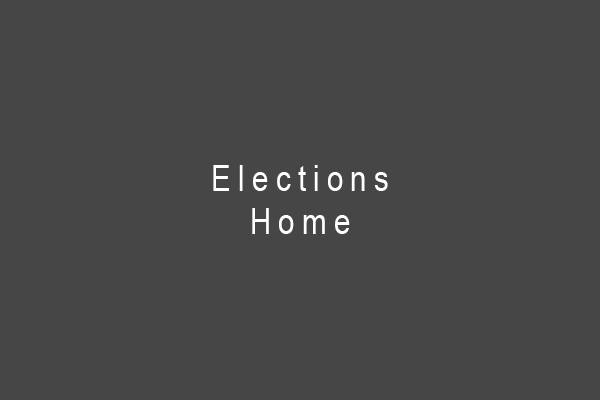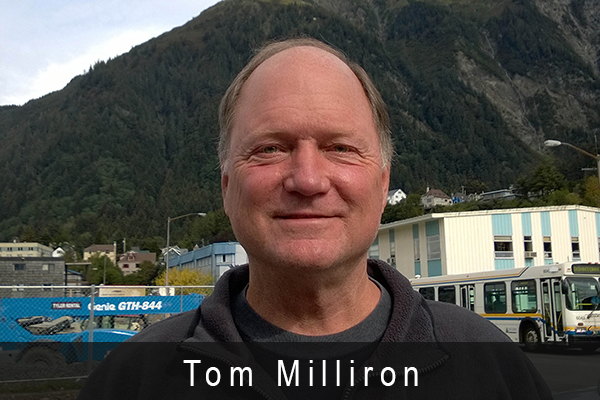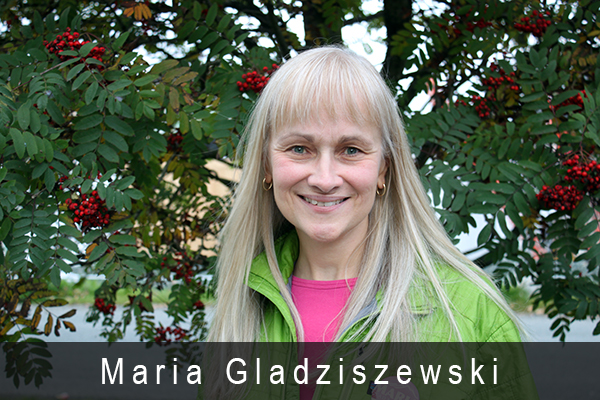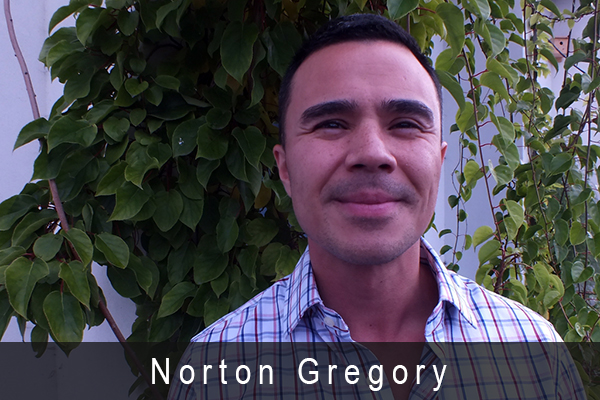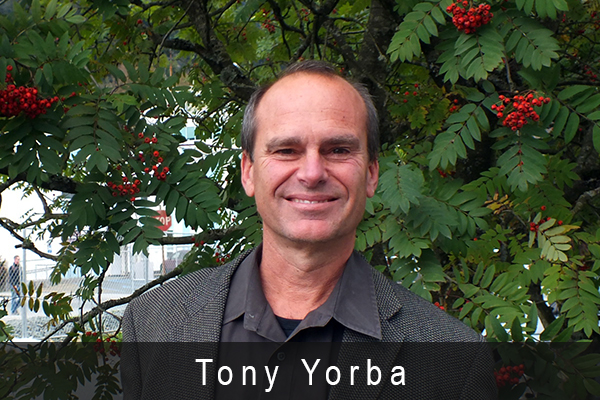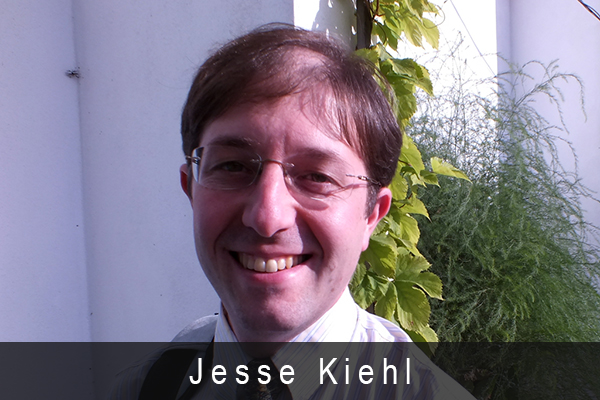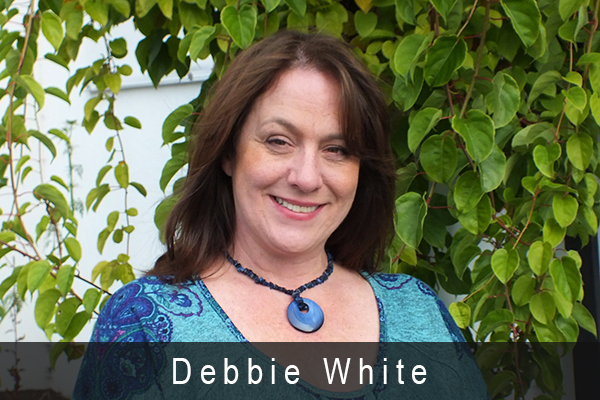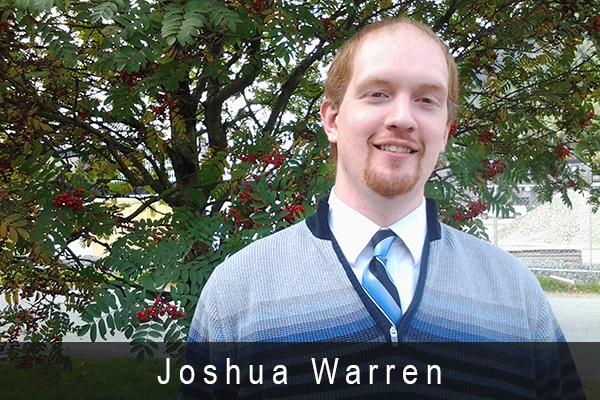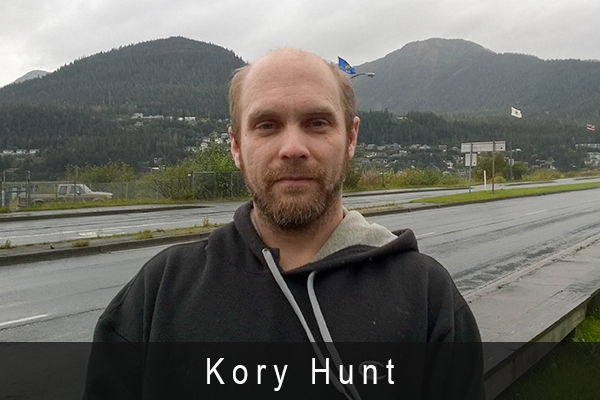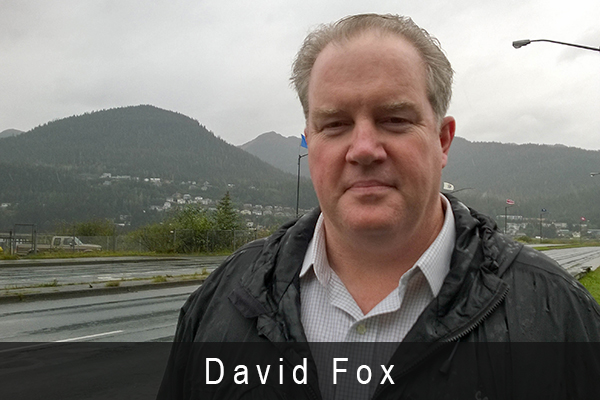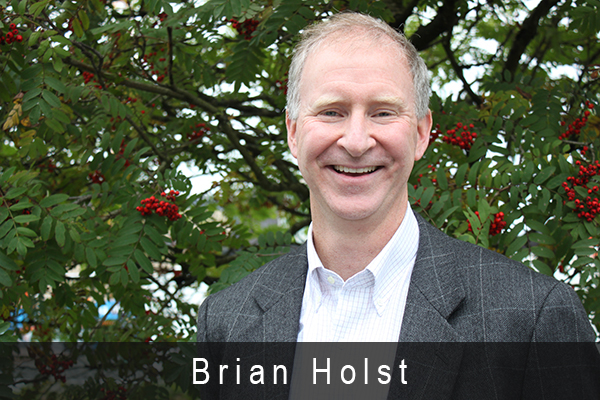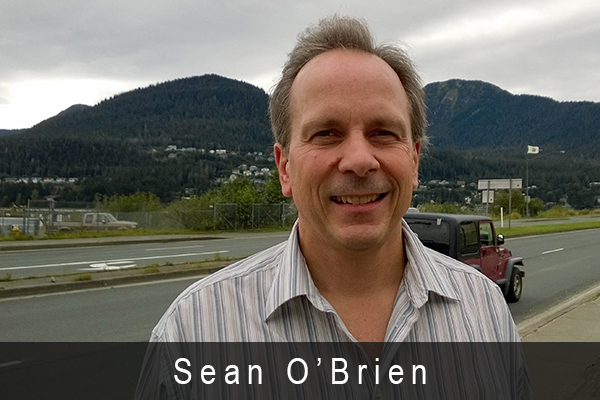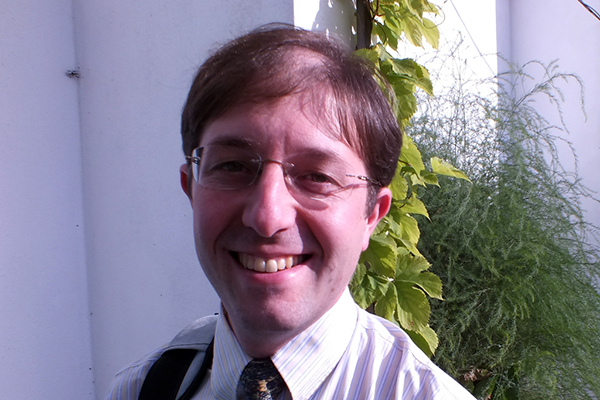
Jesse Kiehl
Age: 38Family: Wife, Karen Allen. Two daughters, ages 12 and 10.
Occupation: Legislative Aide and Assemblymember
Community Involvement: Served six years on the board of Congregation Sukkat Shalom, including a year as chair; teaches religious school.
Volunteers teaching outdoor skills in Juneau middle schools and with Girl Scouts of Alaska.
Has appeared on stage with Theater at Latitude 58.
Hobbies/Interests: Hiking, Theater, Hunting, Target Shooting & Reloading, Cooking.
Previous Government Experience: Intern, U.S. Sen. Ted Stevens, 1996; Intern, Gov. Tony Knowles, 1997; Executive Secretary, Alaska Board of Education & Early Development, 1999-2000; Legislative Aide, Sen. Kim Elton, 2000-2009; Legislative Aide, Sen. Dennis Egan, 2009-Present; CBJ Assembly, 2011-Present.
Positions on Juneau Issues
Housing
According to a 2012 Juneau Economic Development Council report, the capital city needed to add about 700 fair market homes or rental units and nearly 450 subsidized rental units to achieve a healthy housing market. What can the Assembly do to encourage new housing development that meets the needs of Juneau residents?
We’ve got a couple of things that we’re working on and that we need to hold the course on. We have been talking with developers and people who build housing about what their needs are and what their perception is of the things the city controls – permitting processes, cost of permitting – those sorts of issues. And builders have generally been reporting that environment with the city is pretty good, and when they bring forward issues we’re working to address them.We are also working to sell parcels of city land in two areas. Near (Dzantik’i Heeni Middle School) we have a subdivision of city land in six parcels that would be the right size for apartment building type developments. Some might go to affordable housing developers. Some might go to market rate housing developers. The Army Corps of Engineers permit comment period for a little bit of fill that would be necessary for that has closed. There were no negative comments received, so we’re hopeful we’re going to get that permit and be able to move forward. Closer to Auke Bay, Pederson Hill rises above Auke Lake. The city has just done a rezone of land there, and has some money from the past set aside for putting a road in and some utilities in to do a disposal of city land there. We have some that would be zoned appropriate for apartment type developments, and some that would be zoned for fairly dense single-family homes. That would be the same density of development you might see on the Flats downtown. So, we are continuing to move forward on those.
The other thing we’ve done is allow for more housing units per acre in all of our commercial zones, in our mixed use type zones – and I’m grouping a bunch together there. And that’s working too. We’re starting to see more permits come in for people adding apartments above various types of buildings or some denser development.
Juneau’s never going to have lots and lots of land. The vast majority of the land the city owns is on steep slopes, with no road to it, no water to it. So we can’t afford in Juneau, over the long term, to just sprawl all over the place. We need to make the most of the land we have by encouraging higher density development. And where the city gets involved to sell its land, the land that is buildable, we need definitely to have that land in the higher density categories to get the most units out of it.
Homelessness
What are your thoughts on a Housing First facility in Juneau, where chronic inebriates can live and access services, such as Karluk Manor in Anchorage? What role, if any, should the city play in pursuing such a facility?
I support a Housing First project in Juneau. I think it can be an important piece of making a number of bad situations better. There are no magic bullets in this world, but there are folks who are never going to sober up and they’re going to live here. The question is how we handle them. It’s not a crime to be an alcoholic, even a chronic alcoholic who behaves badly. So how we address those individuals who are causing a lot of problems right now is a big challenge.I think that a Housing First project that doesn’t require people to sober up, but gives them a door with a lock on it, so they aren’t constantly afraid of being robbed, being beaten, the research shows that that reduces the problems a lot. They go to the emergency room less, they use Rainforest Recovery less, JPD gets fewer calls, we’re using fewer ambulance trips for those folks and they’re not by and large living on the street harassing people. So, that’s an important step. It’s going to be challenging.
I think the city can step in with help to build or to renovate a building for that kind of project. What we are short on right now is the package of money it’s going to take to operate it. We need help from partners with the state and federal government. And I believe it really would be a good investment for Juneau for us to put some local dollars into that too. But we don’t have enough local dollars to pay the operating cost all on our own.
Downtown Revitalization
Recently a group called the Downtown Improvement Group (DIG) organized a cleanup day in Juneau. What solutions would you offer to make the center of Juneau a better place for residents and visitors alike?
Let’s start with a baseline. Downtown Juneau is in much better shape than it has been just about any time I can think of. Fifteen years ago when my wife and I chose to buy our home and raise our kids downtown, we didn’t have SLAM going up, the Soboleff Center. Since then we have new shops, new restaurants, new buildings, renovated old buildings. The place is hopping.The downside of all that activity, is that those people who have a hard time making it on their own and who kind of live around the edges of our society, of our communities gravitate toward that activity and all that commerce and all those people.
And so, I think we’ve got some opportunities. I’m thrilled at these business groups, like the Downtown Business Association, like the Downtown Improvement Group, working hard on their side of the house and pushing on the city’s side of the house. One of the things that we need to work hardest on, I think, is the twin problems of homelessness and of addiction. And if those were easy nuts to crack, it’d have been done decades ago. But I do think that a Housing First model for those folks who are chronically inebriated and who aren’t going to get completely sober is an important step. The research shows us that it makes a big difference in their lives and in the lives of the rest of the community. And that’s very important, that it’s a benefit to all of us when we provide some housing where those folks can live.
The other thing I want to look hard at: In the last year we did some incentives for subdivisions with regard to taxes. And I think we need to look at vertical building, which is best suited to downtown with its parking garages and density approach to things anyway. There is an incentive for sprinkler systems and there’s an incentive in the historic district. But we need to look at what more we can do to get builders putting more housing above those downtown shops, above those downtown restaurants. That means more eyes on the street. It means more folks paying attention. And I think it will benefit not just our economy, but our community downtown.
Transportation & Infrastructure
What’s your take on the Juneau Access Project (aka the Road)?
The Road is one of those issues that you can start an argument with anytime. I have spent a lot of years looking at a lot of studies on that road. It doesn’t make economic sense. It’s not going to deliver the kind of benefits that they predict. I mean, they’re predicting daily commuters on that road with those kind of traffic counts. And the cost is grossly, vastly underestimated.So I believe that we need to do all we can to improve access to our capital city through the airport, through the internet and various electronic media. I think the funds that the city puts into things like Gavel to Gavel are a huge benefit to Alaskans accessing their capital. But the cost benefit doesn’t make any sense for that proposal.
For years, the city pursued a second crossing between Juneau and Douglas Island. In 2010, Juneau voters rejected a local bond measure that would have paid for the project, and it has not been as high a priority since. Do you support the second crossing, and if so how should it be financed?
I think a crossing between the mainland and North Douglas is a good idea. I think it will help us to reduce a lot of safety problems we have on North Douglas Highway right now. It is basically a 13-mile long driveway and no matter what it’s signed at people drive 60 miles an hour summer and winter. It’s a dangerous road. I think that we can bring a lot of both safety and efficiency and economic benefit with a North Douglas crossing.The financing package is much, much tougher. Right now, it doesn’t meet Uncle Sam’s formulas to help us pay for it. And it’s got to cross a game refuge, which Uncle Sam doesn’t like to put money into doing. So there’s, I think, a lot of consensus building that has to happen to finalize a route and put together a funding package. Ultimately, it is a notion that makes sense for Juneau.
CBJ Budget
The CBJ’s finance experts are projecting multi-million dollar budget shortfalls in upcoming fiscal years. How would you address the shortfalls?Which city services are your priorities to maintain?
The budget is probably my number one priority going forward into another term. We have done a lot of cutting at CBJ. We have wrung the efficiencies that we can out of this budget in most every place we’ve looked, and we’ve started reducing services. I think there are additional services we may end up reducing, but we’re getting close to a point where people are going to notice the impacts on the quality of life in Juneau, the things that attract people to and keep people in our community. And that’s going to be a problem in the long term.So we have looked and we will continue to look at where we spend. We now need to look at how we put together our revenues. There are places where the growth that’s good for our community, the growth that’s good for our economy, is not paying its own way in terms of the city services that we need. Maybe the best example would be that the growth in the senior citizen population is good for Juneau. It’s good for volunteerism, it’s good for families, it’s good for the arts, and it’s good for our culture as a whole. As soon as a resident hits 65 on average half the value of their house is tax free, and their sales are tax free. But the ambulance still has to come just as fast when they call 911 as when a young newlywed in town calls 911. They still want to use a pool, just like young kids want to use a pool.
So we need to look carefully, very carefully, so that we aren’t pricing either group out of Juneau – working people or seniors. They both bring a tremendous amount to our community and to our economy. We need to make sure that as the community grows as whole, that growth also funds the public services that we’re demanding as Juneau citizens. The city right now is involved in looking at all of our tax exemptions. And there are quite a few of them, both on the sales and property sides. So we are looking thoroughly and thoughtfully at what positive impacts those tax exemptions have, and how much they’re costing us. And so at some point – and I’m sure it will be after the election – but at some point the Assembly is going to need to make choices about whether we can afford to continue them all as they are now.
I can tell you, I’ll guarantee you we’re going to make at least one change in the senior sales tax exemption. There are 13,000 senior sales tax exemption cards out there right now. We know there aren’t 13,000 seniors eligible. So we need to get a handle on that program in some way, whether we change the rules or not.Again, when we look at those rules we need to look very carefully and make sure we’re not pricing seniors out of town. But that we’re also raising the revenue we need so that the ambulance does come when you call it.
School Funding
For the first time in years, the Assembly this year did not fund Juneau schools to the maximum amount allowed under state law. Do you categorically support funding to the cap? Why or why not?
Since I moved to Juneau, about 16 years ago something like that, it has always been a source of great pride that we support our public schools to the maximum extent allowable. Over the last five years with stagnant and declining state funding for schools, we have seen the school district cut even more deeply than the city has had to. And it’s gotten to the point where that’s impacting education.I was very disappointed this last year that we couldn’t get even enough additional city contribution to stop the K-5 class sizes from rising. I’m talking to friends who have kids in grade school who have ridiculous numbers of students in the classroom. There comes a point where you’re not teaching, you’re doing crowd control. And it boggles my mind how the teachers get anything into those kids. Somehow they’re doing it.So I think the school district is going to need the city to step up to the maximum extent allowable by law just to keep class sizes from rising again next year. Their fixed costs do not go down year over year. I can tell you that state funding shows no sign of going up next year. That difference has to be made up somewhere. And it’s one of my priorities as an Assembly member to do all we can to educate our kids. That’s Juneau’s future, and it’s not something I think is negotiable if we want a strong community going forward.
Economic Development
The Assembly has hired a consultant to come up with a Juneau Economic Development Plan. What ideas do you have to diversify Juneau’s economy?
When I look at the places we should focus with an economic development plan, number one has to be to strengthen the base we have now. And that is to be the best capital city we can be for all Alaskans, to keep our two large mines operating well, and our tourism industry healthy, and to do all we can to make more of those tourism industry jobs year round jobs.I think that as we look to the future, we see a couple of major trends in the world that we should capitalize on here in Juneau. One is, more and more jobs can be done from anywhere. So for Juneau to attract the people who do those jobs to do them here, we need to ensure that we have the quality of life and the quality of schools and the type of community, the type of safe, welcoming community that attracts people who really could live anyplace on the planet. There’s a lot we can do, I think, to strengthen Juneau as a community that attracts those people who work in those knowledge industries.
The other thing that I think will not slow down as we look into the next century is that a huge amount of the world’s economy really revolves around managing money. Very few people realize Juneau is a colossal financial management hub. And it’s because we’re the capital city, because the state’s Division of Investments is here, because the investment managers who manage the state’s retirement systems are here, because the Alaska Permanent Fund Corp. is here. And yet our private sector money management firms are generally small. They tend to be fairly boutique operations. And I think we have the possibility here in Juneau to strengthen our university, to strengthen the things we do as a public sector and capitalize on and build that financial industry here in Juneau. I think it’s an unmet opportunity that we can seize as we look into the long term for Juneau’s future.
I guess what I would say is, you have to build from a strong base. And nothing wilts faster than laurels you’re resting on. So, we need to be the best capital city we can be, we need to keep our tourism industry healthy and providing as many year round jobs that we can. Those large mines, our fish processors, our commercial fishing families, I don’t ever want to trade those things for future opportunities. I want to strengthen those and build from there.
How do you feel about the city facilitating the reopening of the AJ Mine?
What did I say, the Road is a sure fire way to start an argument in any room? You just gave me the second one, right? We know that it’s possible to do hard rock mining right in Southeast Alaska. We have two responsible hard rock mines within the borough. Neither one of them is under our downtown tourism district or neighborhoods; neither one of them sits underneath our water supply. So this question is a great deal thornier than the others we face.The second piece of it, beyond neighborhood impacts and the water supply question, is how does a government who is an owner also serve as the community’s watchdog? And I think that’s such a difficult question that it probably explains why we haven’t seen mining companies step in to come into Juneau and say, that’s the one for us.
We do see exploration in other places in the City and Borough of Juneau. And so I think the Assembly needs to take a good look at our large mine ordinance, and make sure that it strikes the right balance between doing it right and protecting our community. And as potential developers look at the gold resources around Juneau, that can be an important part of our economic future.
Public Safety
In 2013, Juneau police seized nearly $2 million in illegal drugs and drug money. What can the Assembly do to curb drug use in Juneau?
I think JPD does a really strong job of investigating and trying to break apart rings of drug dealers and the drug importation into our community and it’s very important that the Assembly continue to support the police department in that mission. And we’ve done that and I think we’ll continue to do that.The problems of addiction are really the demand side of supply and demand. I think JPD works very hard, and pretty effectively, on the supply side. The demand side is tough. I think the things we do as a community to strengthen our youth and our opportunities for youth, to address addiction and the problems it causes all work at the edges, because addiction really is a chronic and a worldwide illness.
So we need to continue our support for JAMHI (Juneau Alliance for Mental Health Inc.), because a lot of folks start into the addiction problem as they’re trying to self-medicate their mental health problems. We need to continue our support for other nonprofits that strengthen connections between people in our community. And ultimately we need to make sure that we have opportunities for people, so that people don’t get into the cycle of hopelessness and helplessness, and so that people who do make these terrible mistakes have opportunities as they try and climb out of the pit that addiction can be.
Voter Turnout
Voter turnout in Juneau has been abysmal for several years. The city has not seen more than 50 percent of voters participate in a municipal elections in 20 years. As a prospective city official, what can be done to increase civic engagement?
How to get people to care about who runs city government? We keep reaching out. I try and make it a point to answer the emails that come in, to return the phone calls I get, because when people want to talk to their elected officials they deserve to get an answer. I have spoken to every school class I’ve ever been asked to speak to. Sometimes the scheduling has been tricky. We make it happen, so that young people in Juneau have a chance to see and to meet their elected officials and to talk with us and we get to hear what they think as well. They need to know that it matters what they think, and it matters what they have to say with their vote.I do everything I can to make myself available to the public broadly. So I’ve got an Assembly Facebook page, and people sometimes post questions and get into discussions with me there. I’ve got a Twitter feed, anybody can find me and reach me there.
Ultimately, I think the work that we do and people’s interest in it is going to drive them to or away from the polls. I have always tried to make a priority of listening carefully to what people say to the Assembly. Whether they come down to the Assembly chambers in person or whether they get in touch with us electronically, to be responsive and when necessary when people make a good argument for why we’re going in the wrong direction to turn things around. That’s the heart and soul of it. I think we have to be responsive to people. And I’ve tried to do that, and I hope people will continue to get in touch with me.
I also think that we can ask a little more often and a little more publicly. I don’t think we ought to have an empowered board to run our city pools. But in the end I voted to put the question on the ballot, because I think it’s fair to ask the voters what they think. I think what we have seen is that enough people who care about those pools and who watch closely how they’re managed came to us in the budget process with ideas to do a more efficient job, to do a better job. We don’t need an empowered board to look at those suggestions and to take those suggestions. We as an Assembly can do that. And my concern is that if we give a board a target and say, ‘You will raise this percentage of what it costs to run the pools,’ we’re going to start pricing low-income people out of our pools. And that’s something the Assembly needs to be accountable for doing or not doing. I voted to put the question on the ballot so that the voters can tell us what they think of that question.
Whether they think it’s a good idea, or whether they share that concern that people in Juneau who don’t make a lot of money and can’t a dramatically increased set of pool fees may not be able to have access to those public facilities.
Southeast Footwear
XTRATUFs or Bogs?
Muck Boots. They’re made in America.
